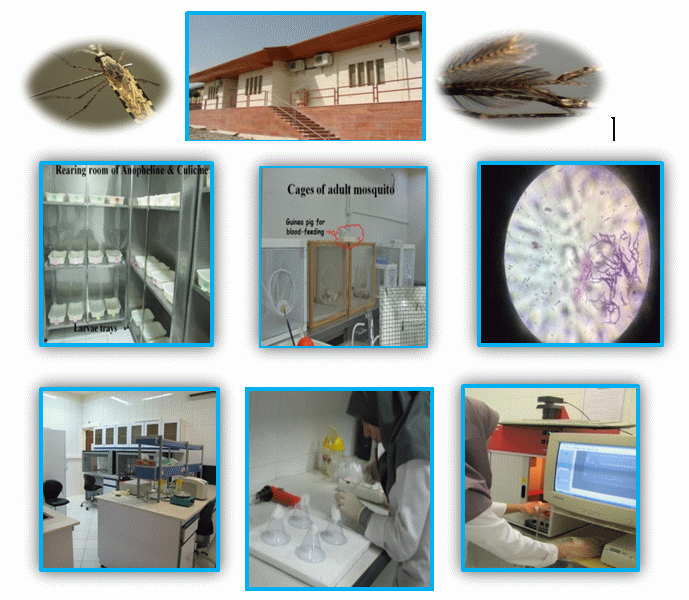|

Our Goals:To
combat Vector-Borne Diseases (VBD), especially in Eastern Mediterranean Region (EMR) and worldwide by achieving self-reliance in advanced and applied research and development (R&D) through joint and complementary R&D programs, technology channeling, positive synergy and smart partnership.
Our Strategies:
• We stay in close contact and coordination with NMCP/CDC/MOH, WHO/EMRO/RBM and Departments of VBDs worldwide
• We design, implement and evaluate both applied and basic researches
• We work in VBD-endemic countries
• We share field and laboratory experiences worldwide
• We urge to led our research to product development
R&D on Plasmodium and Vectors
Malaria and Vector Research Group (MVRG) was established in Biotechnology Research Center in 2000 and approved as a separate Department in 2006. Multidisciplinary approaches are used in MVRG including the R&D related to vaccine development, drug discovery, Plasmodium and vector species diagnosis, drug and insecticide resistance, host-parasite interactions, transgenic, paratransgenic and also insect’s by-products. Collaboration with National Malaria Control Program, World Health Organization and other organizations, universities and research centers is the priority for designing and implementing MVRG activities. At the moment, MVRG is consisting of three sections; “R&D on Plasmodium and Vectors”, "the National Reference Laboratory for Molecular Diagnosis of Malaria" in Tehran, and "the National Insectarium Platform, a candidate WHO Collaborating Centre" in Karaj site of "Research & Production Complex of PII".In addition, MVRG has six different labs including:1-Vaccine
Development 2-Molecular Monitoring of Plasmodium Drug Resistance, 3-Anopheles-Plasmodium Interactions, 4-Molecular Monitoring of Insecticide Resistance in Vectors, 5-Insect Natural Products
Drug and Insecticide Discovery is also a corner stone research activity, which is performing under joint collaborations with other Departments, universities and institutes.
MVRG policies as National Reference Lab.
NationalReferenceLaboratory ofMolecularMalaria (under supervision of Prof. Zakeri) Assist the CDC in MOH and WHO/EMRO in malaria control and elimination campaigns:
► Basic, applied and operational research:
Molecular diagnosis of infected malaria parasite
Immunology and molecular parasitology from lab to field
Analyzing human-P.falciparum and P. vivax immune interactions
Surveillance of anti-malarial drug resistance
► Assistance in evaluation of malaria elimination programms in Iran:
Providing baseline data for monitoring the impact of malaria control and elimination strategies using serology method
► Training/workshop at the national and regional level
► Set up standard guidelines and protocols for elimination strategies in Iran
National Insectarium (R&D and Training Centre for VBDs):
Following WHO/EMRO request for MVRG assistance in 2005, this 450 square meters innovative infrastructure has been established and is fully functional since 2010 in PII, aiming to provide the edge of knowledge core facilities and expertise for working on different arthropod and insects transmitting pathogens that causing vector-borne diseases (VBDs) in order to:
a) Providing equal opportunity for all scientists in Iran, WHO/EMRO and Pasteur Institutes' Network (RIIP)
b) Facilitate the cooperation and collaboration on applied genomics and proteomics studies for control of VBDs.
The sections and laboratories in National Insectarium are:
• Insect Rearing Laboratories: Routine rearing of Culicidae mosquitoes (Anopheles, Culex, Aedes spp), Lucilia sericata and temporary project-based rearing of sand flies, fleas, ticks, scorpions
• Morphological Studies Laboratory: identification, dissection, preparation of morphological keys, and comparative systematic
• Insecticides Laboratory: WHO routine susceptibility tests for different medically important arthropods
• Molecular Studies Laboratory: DNA, RNA extraction, PCR, RT, RFLP, cloning, expression, protein purification, bioinformatics, etc
• Cell Culture Laboratory: in vitro continues culture of P. falciparum, insect cell culture, …
• Microbiology Laboratory: Detection and identification of microbial flora within medically important arthropods as paratransgenic agents
• Challenge Laboratory for vaccine development
• A “BioBank” for medically important arthropods and the pathogens they transmit
• Lecture Room

MVRG is part of the following Networks:
► RIIP (Institute Pasteur's International Network) Malaria Network

► PAYAMNET (Iran, Pakistan, Afghanistan) Malaria Network in WHO/EMRO

► National Malaria Network (in collaboration with CDC and Medical Sciences Universities)

Group Members:
|















